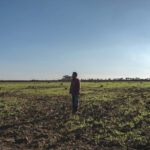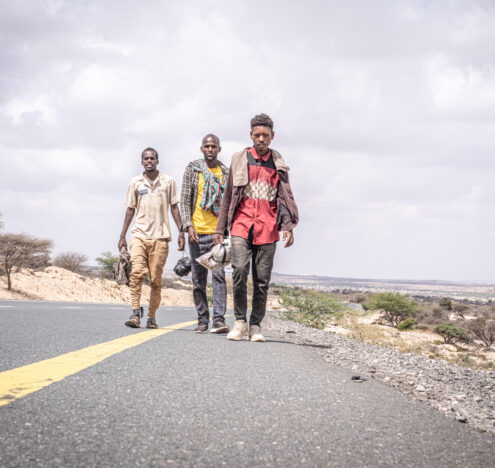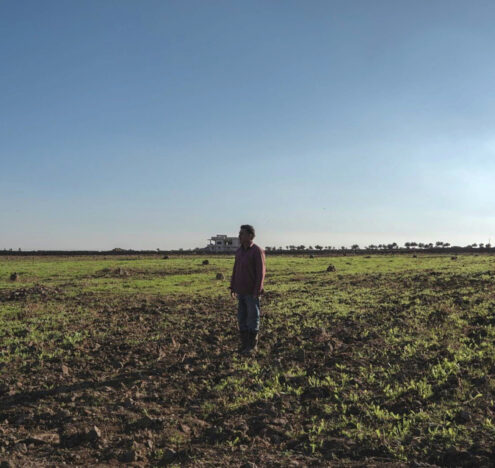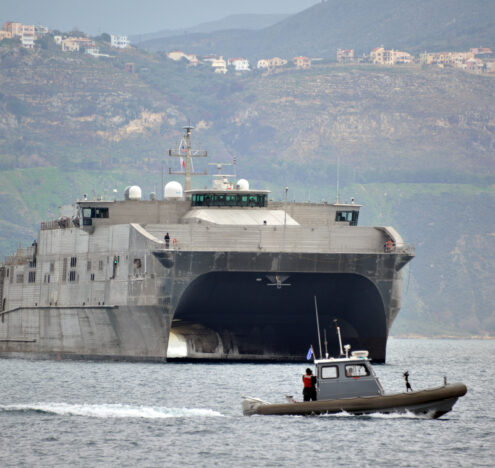The arrival of dozens of fighters linked to the Wagner Group last month in Bangui, the capital of the Central African Republic (CAR), put to rest weeks of speculation that President Vladimir Putin may be dismantling the group’s operations in Africa. The rumor was sparked recently when evidence emerged of Wagner operatives leaving CAR for Russia in the wake of its founder Yevgeny Prigozhin’s failed mutiny in Moscow, thereby raising concerns about the group’s operational viability in the region. But this has now been explained to be a regular troop rotation rather than a drawdown.
“I am sending a new batch of highly qualified professionals with extensive experience in the PMS Wagner who will be incredibly helpful in training the Central African Republic security forces and keeping this country safe,” Aleksandr Aleksandrovich Ivanov, Head of the Officer’s Union for International Security (OUIS), announced in a statement on its website on July 19, 2023. The newly deployed operatives provided security during the constitutional referendum, which was held on Sunday, July 30, 2023. The outcome of the poll meant to extend President Faustin-Archange Touadéra’s term limits, which remains unknown.
The OUIS describes itself as “an association of people advocating for peace and stability” and as “Russian instructors” in CAR. But its links to the Wagner Group have become obvious over time. In early 2021, the Wagner Group used OUIS to hide a surge of its personnel operating in CAR, an action that resulted in its being sanctioned by the United States in January 2023.
Wagner, however, has been involved in CAR before OUIS. The group first intervened in the country in 2018 when it sent about 1,200 mercenaries to protect the Touadéra government against a patchwork of rebels in the country’s civil war. Rich in mineral resources like gold, diamonds, and timber, CAR has regularly relapsed into violent conflict since its independence in 1960. Touadéra, who was first elected in 2016 and won re-election in 2020, has become heavily reliant on Russia’s support, with some of Wagner soldiers forming part of Touadera’s security detail.
Expansion
Although usually accused by the UN and Western rivals of human rights abuses, including torture and killing of civilians, the Wagner Group has become crucial to the security of at least half a dozen countries in the troubled Sahel. In addition to CAR, these include Libya, Sudan, Mali, and Burkina Faso — all countries formally within France’s sphere of influence but where the entry of Wagner forces has coincided with the expulsion or reduction in the role of the former colonial power.
In the weeks following Prigozhin’s failed mutiny, concerns had emerged about the prospect of Wagner’s activities — which range from combat operations, disinformation campaigns, and personal protection — winding down in Africa. Contrary to this expectation, new information has now emerged suggesting that Wagner may be looking toward expansion rather than a reduction of its presence in Africa.
Since the mutiny, Moscow has struggled to reassure allies that Wagner’s operations are not affected by the rebellion, but this leaves out the question of what role, if any, Prigozhin will play in the new situation.
In a statement on July 19, 2023, Ivanov confirmed: “I managed to speak with Yevgeny Prigozhin. He confirmed that part of the African assets had indeed been sold, but ‘on the other hand, all the salaries of the fighters have been paid in full.’ Despite the change in the African company, Yevgeny Vicktorovitch [Prigozhin] has again confirmed that he does not intend to reduce, but to expand his presence in Africa.”
He also indicated that Prigozhin alluded to “concrete negotiations” being underway, although about what and with whom, he didn’t reveal. Before now, however, Russian media had reported about a meeting that took place between Putin and the Wagner boss in the Kremlin just a few days after the aborted mutiny on June 29, 2023. During the meeting in the Kremlin, Prigozhin and Wagner commanders were offered “further options for employment.” Part of the deal with Prigozhin following the mutiny in Moscow was for his men to sign new contracts with the Russian army if they want to continue to operate.
Dilemma
“While this is still unfolding, I anticipate that Wagner’s activities in Africa will not be affected. They have become a very useful tool of Russian foreign policy in Africa — gaining significant influence with limited costs. Given that Africa remains a very permissive environment for Russian engagement, I suspect that we’ll continue to see Wagner (or a reconstituted version of Wagner) continue to operate in Africa. In fact, if Wagner withdraws forces from the Ukraine theater, we may even see increased deployments to the continent,” Joseph Siegle, the director of Research at National Defense University’s Africa Center for Strategic Studies, told Inkstick.
Prigozhin rebelled against the Russian military establishment last month in a move that has been described as the greatest threat to Putin’s authority in two decades. Following the failed mutiny, Prigozhin accepted a deal brokered by Belarus’ President Alexander Lukashenko to retire to Belarus and have his troops accept new contracts with the Russian government. At least 3,650 of Wagner’s soldiers traveled to the Belarusian town of Asipovichy in a mass exodus afterward.
Since the mutiny, Moscow has struggled to reassure allies that Wagner’s operations are not affected by the rebellion, but this leaves out the question of what role, if any, Prigozhin will play in the new situation. According to Russian media, Putin and Lukashenko met on Sunday, July 21, 2023, in St. Petersburg, where the latter complained about the difficulty he is facing with restraining the Wagner boss from marching on Warsaw. “The Wagnerites are beginning to stretch us. I ask: ‘Why do you need to go to the West?’ [They reply:] ‘We want to go on an excursion to Warsaw, to Rzeszow,’” the Belarusian President was quoted as saying.
“Prigozhin is still living because he holds a lot of assets for Putin. Looking back at the antecedent of Putin, it is just a matter of time. Prigozhin understands the game and knows that he is a dead man walking,” Sunday Oludare Ogunlana, a global security expert and Professor of National Security at Collin College in Texas, explained to Inkstick.
A New Surge
But continuing with Wagner or a new version of it without Prigozhin will not be easy, analysts say. Prigozhin is central to all of Wagner’s complex operations in Africa — paramilitaries, election interference, disinformation, and arms for resources deals. This will be very difficult for Russia to replicate if he is sidelined, let alone eliminated. “If Prigozhin is sidelined, it will have significant implications for Russia’s engagements in Africa. Much of Russia’s influence has been generated by Prigozhin and his array of military, political, disinformation, mining, and weapons firms that work collectively to support regimes friendly to Moscow,” Siegle told Inkstick.
“I can’t see this,” said Alex Vines, referring to fears that sidelining the Wagner boss could precipitate the group’s splintering. Vines is the Director of the Africa Programme at Chatham House, and in his view, one of the key issues will be fewer operatives with low morale. He said the bigger challenge would be the attitude of African states toward continuous partnership with the mercenary group. “I do think that the military junta in Mali will especially need to reflect whether Wagner is a long-term partner. Especially as ECOWAS [Economic Community of West African States] and Nigeria will become a lot more assertive. We may see greater pressure to replace Wagner with a more effective regional force,” Vines added.
But for now, the uncertainty over the status of Wagner is becoming deeply unsettling for African regimes, which have become heavily reliant on the group, and by extension, Russia. A way out, argues Siegle, is for Moscow to ban Prigozhin from Russia while giving him free rein to operate in Africa. “This will lead to a new surge of Wagner activity in Africa. Wagner already had plans to expand on the continent because it is such a permissive environment. So, if given the opportunity, Wagner could easily become involved in a half dozen other countries,” Siegle told Inkstick.
“The recent coup in Niger might just be the opportunity Wagner needs to expand,” Ogunlana explained. Niger, a poor, arid but resource-rich country located in the heart of the Sahel, had long been seen as a bulwark of the West in a region beset by Islamic terrorism whose persistence, despite years of regional and global security initiatives, has contributed to a growing anti-French sentiment. On Wednesday, July 26, 2023, soldiers loyal to General Abdourahmane Tiani, head of the country’s Presidential Guard, seized power after ousting President Mohamed Bazoum, prompting violent protests and attacks by protesters waving Russia flags on the French embassy.
“We want France out from our country because France brings only trouble, poverty, and terrorism,” Aboubacar Salou Maiga told Inkstick. Maiga, 44, is an engineer who lives in Niger’s capital, Niamey. Although not a member of M62 — a civilian movement founded last year by activist, Abdoulaye Seydou, to protest French military interventions in Niger — he agrees with the movement’s aims. Since last week, the movement has been organizing protests to support the coup and demand an end to the French presence in Niger and the dismissal of the French ambassador. “Russia is a serious country. Their partnership is win-win while France is a thief,” Maiga added, echoing the sentiment of the thousands who have been protesting since Bazoum’s ouster a week ago.
The protest and attacks have forced France to evacuate its citizens from the country as the unrest continued amidst a standoff with the regional body, ECOWAS, which threatened to use force unless constitutional order is restored within a week. About 1000 French soldiers are still stationed in Niamey after redeployment last year following the expulsion of French-led Operation Barkhane from Mali by the Assimi Goita junta that blamed France for the country’s unabating jihadist violence. In February this year, at least 13 civilians and 70 soldiers were killed in multiple attacks by jihadists in villages in central Mali and the border of northern Burkina Faso.Proghizon, who was spotted at the recent Africa-Russia summit, has hailed the coup describing it as “a struggle of the people of Niger with their colonizers” while also assuring its clients of its readiness to continue to supply its services. “We are not cutting (the staff), and moreover, we are ready to increase our presence. At the moment, all obligations are being fulfilled and will be fulfilled at all costs,” Prigozhin said in a recent phone interview with Cameroon-based outlet AfriqueMedia.




















